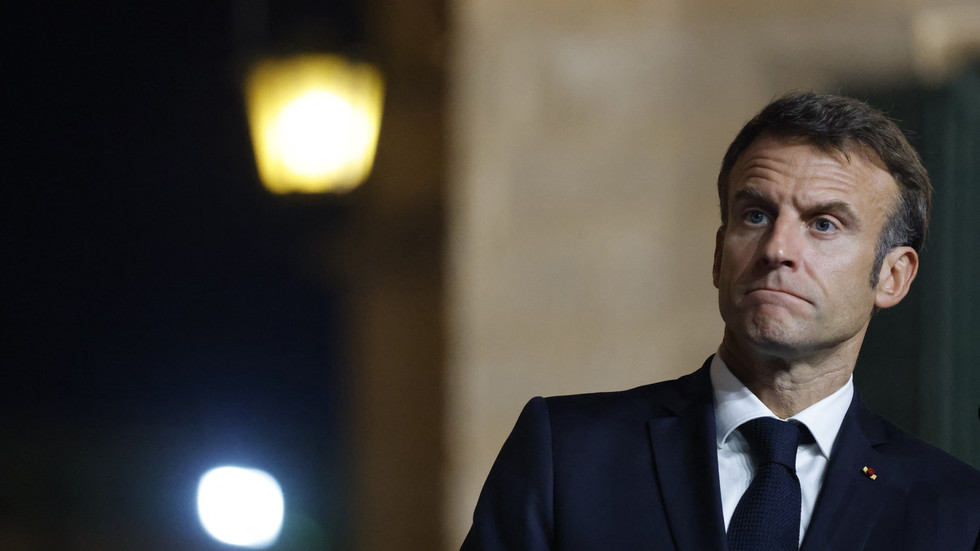
Niamey has won big against neo-colonialism, but its enemies could now resort to a covert technique they’ve already used in Africa.
By Hafsa Kara-Mustapha, journalist, political analyst and commentator with a special focus on the Middle East and Africa whose work has been published in multiple international publications. Hafsa is regularly featured as a pundit on TV and radio, including on RT and Press TV.
© Ludovic MARIN / AFP
“France has decided to withdraw its ambassador. In the next hours, our ambassador and several diplomats will return to France. And we will put an end to our military cooperation with the Niger authorities,” these were the words French President Emmanuel Macron said on the France 2 television channel a week ago.
Macron made the announcement two months after Niger’s President Mohamed Bazoum was deposed following a military coup by his protection officers one month after massive protests with demands for French troops to leave took place outside a French military base in the capital, Niamey.
While military putsches are usually a cause for concern and seen as a sign of the failure of democratic rule, in July, the streets of Niamey erupted in joyful celebration. It appears the population of this landlocked nation, educated and well-versed in world politics, has decided that France’s tacit rule over it must come to an end.
Niger, like many other countries on the African continent, is at a crossroads of ambiguities. On the one hand, it has bountiful natural resources on its territory, while on the other, it is one of the poorest nations on the planet. The landlocked Sahel country is not only a significant uranium producer; it boasts gold, coal, iron ore, and even petroleum. Yet, close to 42% of its population suffers from extreme poverty, according to the World Bank.
How can this major uranium producer, providing some 20% of France’s needs, be in such dire straits? Nigeriens agree that corrupt pro-Western leaders have caused the country to remain poor while guaranteeing Westerners a quality of life locals can only dream of.
Read more
The first reaction to the coup, from both Western countries and pro-Western governments on the continent, was swift: Bazoum was to be returned to office or else military intervention by the Economic Community of West African States (ECOWAS) and ensuing sanctions, in addition to a plethora of threats that have become recurrent whenever an African nation dares claim its rights.
This time, however, reactions on the ground differed. ECOWAS’ threat was met with defiance by both the new rulers of Niger and neighboring countries, all stating their opposition to military intervention in the internal affairs of a sovereign nation. Algeria, which borders Niger and has its own tense relations with its former colonial ruler France, banned French planes from using Algerian air space in the event of a military operation. (France, however, later denied having made the request).
In addition to blatantly exploiting Niger’s wealth, France had installed a military base with close to 1,500 soldiers stationed in and around the country’s capital. The stated reason was to maintain peace and ensure Islamist militias operating in the Sahel region would be kept in check. However, far from being a pacifying force, the presence of these foreign soldiers has exacerbated the security situation, with locals reporting alarming levels of crime since they were stationed in 2013.
Although France insists its troops are a force for good in the region, it avoids mentioning the role it played in the destabilization of Africa in the first place when it supported the ousting of Libyan leader Muammar Gaddafi in 2011, sparking a civil conflict that is yet to come to an end. During that NATO-led onslaught on one of the most prosperous countries on the continent, militias were provided with arms aplenty, which they are now using to terrorize Libyans and neighboring states.
Furthermore, the fall of the government led to a release en masse of former Islamist inmates who, upon freedom, took up arms again. This, in turn, spilled over to Mali, which was faced with its own Islamist insurgency. Thus, France created a problem and then offered a solution to the problem it initially started, ensuring that a difficult situation turned into an inextricable crisis.
Many commentators in Niger fear a return of religious extremism and the emergence of violent militias in the aftermath of the coup that saw French interests seriously undermined in the region. They suspect France would foment tensions to justify a return of its military personnel on the ground, especially as Macron has suffered a significant blow to his plan for reinforced France-Africa relations.
Read more
The French president initially held firm in the days following the coup; however, Nigerien resilience and the support the army has continued to enjoy from the people have forced Emmanuel Macron to blink first. In a humiliating new twist, France’s ambassador to Niamey, who had vowed to remain and support the former leadership, will now be leaving his residence and heading back to Paris with no replacement for the foreseeable future planned. French troops are also withdrawing.
While the soldiers’ exit is good news, the threat of fabricated strife cannot be ruled out. This, after all, is an old imperialist technique first used in the aftermath of decolonization in the late 1960s, when French far-right underground organizations ran a program aptly dubbed ‘strategy of tension.’ This policy, initiated in newly independent North African states, was headed by former French Army Captain Yves Guerin-Serac, and its mission was to trigger ethnic strife within these nations that would snowball into internal conflicts.
Consequently, France would therefore be viewed as a force for good, and locals would welcome the return of their colonial masters. This ensuing unrest would also demonstrate that African nations cannot govern themselves. While the activities of Guerin-Serac were eventually exposed and his plans failed in the Maghreb region, elsewhere in Africa, artificial unrest serving Western interests has often been noted as the cause for stagnating economies and resource-rich nations’ inability to develop adequately.
Niger’s fears are, of course, understandable. These ‘strategies of tension’ have often been used, albeit under different banners, in Africa and across Latin America when governments showed a desire to emancipate themselves from the chokehold of Western interference.
For now, the military officers in Niger have scored significant successes – by holding firm in the face of ECOWAS threats and getting France to withdraw its diplomats and soldiers.
This has seriously dented France’s infamous and ongoing ‘Francafrique’ policy, a term designed to highlight the clandestine and corrupt nature of Franco-African political and economic networks in the region’s former colonies.
Given how reliant it is on nuclear power plants and, in turn, on uranium, France is unlikely to take this brazen attack on its interests lightly. However, with a renewed sense of confidence and a rising generation of African politicians determined to distance themselves from past habits, Niger is ready to fight back.
The statements, views and opinions expressed in this column are solely those of the author and do not necessarily represent those of RT.




